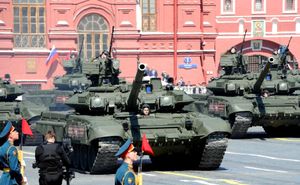Haiti is facing unprecedented levels of gang violence, plunging the nation, particularly its capital Port-au-Prince, deepening chaos and suffering. Over the last week alone, the United Nations reported at least 150 fatalities attributed to escalated gang conflicts, with many of the casualties resulting from confrontations between gang members and police.
According to the UN Office of the High Commissioner for Human Rights, around 55 percent of the deaths reported stemmed from these violent clashes. The fallout from this violence hasn't just been tragic but also widespread; approximately 92 individuals sustained injuries, and around 20,000 people have been displaced, forced to flee from their homes.
"The estimated four million residents of Port-au-Prince are practically being held hostage, as gangs now control all the main roads leading to and from the city," said Volker Turk, the UN high commissioner. He urged immediate action, warning, "The latest upsurge in violence is only the beginning of worse to come. Haiti must not be allowed to descend any more deeply than it already has."
Haiti’s troubles are not new; the country has struggled against powerful armed groups for years. These gangs frequently maintain ties to the very political and business leaders who should be preserving order. Still, considerable deterioration has happened since President Jovenel Moïse's assassination back in July 2021, which created a significant power vacuum. This absence of leadership saw the gangs launching brazen attacks on state institutions, leading to political turmoil.
The situation forced the resignation of Haiti’s unelected prime minister earlier this year and prompted the establishment of a transitional presidential council along with the introduction of the Multinational Security Support Mission (MSS), backed by the UN. Despite these efforts, the MSS – which was intended to stabilize Haiti – has so far failed to regain control from armed factions.
While the deployment from this Kenya-led mission reported only about 416 personnel on the ground as of now, additional forces have yet to arrive. The United States is pushing for increased funding and troops for the MSS to effectively manage the situation.
Monica Juma, Kenya’s national security adviser, highlighted the urgency for more troops as the current number remains inadequate for the task. At the UN Security Council session, she stressed the need for prompt deployment, saying, "The urgency for increasing MSS personnel is evident."
The history of UN interventions complicates the situation. Many Haitians harbor skepticism toward the UN’s involvement due to past operations seen as harmful. A cholera epidemic was tied back to UN peacekeepers, leading to thousands of deaths, and claims of sexual abuse also marked previous missions.
Despite such apprehensions, civil society leaders have tentatively welcomed the Kenya-led multinational effort as potentially beneficial against the rampant gang violence. Yet they caution against relying solely on military intervention, advocating instead for substantial backing and training for the national police force alongside addressing entrenched corruption.
The power struggle within the capital is palpable. Gang control extends across roughly 80 percent of Port-au-Prince. Recent violent episodes have even closed down the main airport after gunfire interrupted flights, isolatiing the country even more from the outside world.
Adding to the political chaos, gunfire led to the abrupt dismissal of interim prime minister Gary Conille, who was replaced by Alix Didier Fils-Aime, as the transitional council attempted to rebuild the state's torn institutions.
During the UN session, Miroslav Jenca, assistant secretary-general, painted a grim picture, pointing out, "Haiti is experiencing not just another wave of insecurity – it is facing dramatic escalations with no signs of abatement. The human consequences are severe and deeply concerning, particularly affecting the safety and basic rights of individuals living under gang governance, especially women and children."
With many Haitians stuck in gang-controlled zones and fear rampant, urgent interventions are becoming increasingly necessary to stabilize this beleaguered nation.



